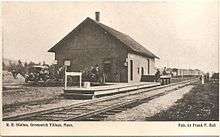Greenwich, Massachusetts
| Greenwich, Massachusetts | |
|---|---|
| Town | |
| Coordinates: 42°21′33″N 72°17′47″W / 42.35917°N 72.29639°WCoordinates: 42°21′33″N 72°17′47″W / 42.35917°N 72.29639°W | |
| Country | United States |
| State | Massachusetts |
| County | Hampshire |
| Incorporated | 1739 |
| Disincorporated | April 28, 1938 |
| Time zone | Eastern (UTC-5) |
| • Summer (DST) | Eastern (UTC) |
Greenwich (pronounced "green-witch")[1] was a town in Hampshire County, Massachusetts. The town was lost as a result of the formation of the Quabbin Reservoir.
History

It was established in 1739 as Quabbin, incorporated as Quabbin Parish in 1754, and became the town of Greenwich (named for John Campbell, Duke of Greenwich) in 1754. It was located along the East and Middle branches of the Swift River. The Athol Branch of the Boston and Albany Railroad ran through the center of town, as did Route 21. It was well known for its lakes and ponds, which were popular vacation spots. It bordered four towns—Enfield, Prescott, Dana, and Hardwick.
Greenwich was disincorporated on April 28, 1938, as part of the creation of the Quabbin Reservoir. Upon disincorporation, portions of the town were annexed to the adjacent towns of Hardwick, New Salem, Petersham, and Ware. (Because of the redrawing of town lines, the land is no longer completely in Hampshire County; only the portion located in Ware is.) Because most of Greenwich was at lower elevation than the surrounding towns, it is now largely submerged, except for the hilltops of Curtis Hill, Mount Lizzie and Mount Pomeroy, which are now islands.
Greenwich House, an on-campus living facility at Hampshire College in Amherst, Massachusetts, is named after the former town.
The song "My Grandfather's Clock", by Henry C. Work (the authorship has been disputed) was written about the tall clock written by Work's father-in-law, Daniel C. Parker. The clock was not "bought on the morn of the day that he was born"; but Parker was always proud of the clock. Parker did live to see his 90th birthday; and while the clock may indeed have stopped on the day that Parker died, the clock did run again. It is still in the possession of one of Parker's descendants.
The song was supposedly written by Work during a lunch break from his work at Walker's Sawmill, in the Greenwich Village section of town, as Work relaxed by the mill's pond.
Quabbin towns
Notable residents
- Mason C. Darling (1801–1866), Massachusetts and Wisconsin physician, legislator
- Joseph Pomeroy Root (1826–1885), Free Stater, first Lieutenant Governor of Kansas
- Randolph Barnes Marcy (1812-1887), Major General, U.S. Army, Civil War
- Dr. Mary Walker (1832-1919), Lieutenant and Surgeon, U.S. Army, Civil War; first woman to be awarded the Congressional Medal of Honor
- Amiel Weeks Whipple (1816-1863), Major General, U.S. Army; mortally wounded at the Battle of Chancellorsville, May 3, 1863; died on May 7
References
- ↑ Peirce, Elizabeth. Images of America: The Lost Towns of Quabbin Valley. Arcadia Publishing, 2003. p. 55. ISBN 978-0-7385-1219-8
- Tougias, Michael. Quabbin: A History and Explorer's Guide. Yarmouth Port, Massachusetts: On Cape Publications, 2002.
External links
- Map showing the towns buried under Quabbin as they looked in 1912, with original house locations and current reservoir water level
